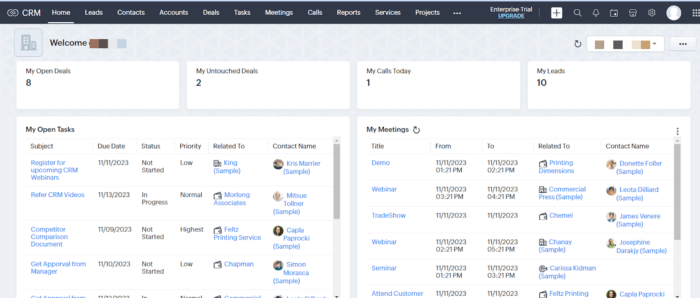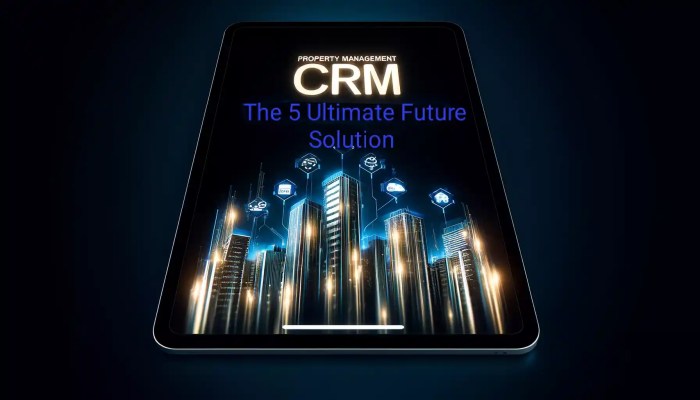The real estate industry is dynamic and competitive. Managing properties effectively requires streamlined processes, efficient communication, and meticulous record-keeping. This is where Property Management CRM software steps in, offering a centralized platform to manage all aspects of your business, from tenant communication to lease agreements and maintenance requests. This detailed guide explores the intricacies of property management CRM software, highlighting its key features, benefits, and considerations for selection.
Understanding Property Management CRM Software
Property Management CRM (Customer Relationship Management) software is a specialized tool designed to automate and optimize various tasks involved in managing rental properties, homeowner associations (HOAs), or even commercial real estate portfolios. It acts as a central hub, consolidating information and streamlining workflows to improve efficiency and profitability. Unlike generic CRM systems, property management CRMs are tailored to the unique needs of the real estate industry, incorporating features specifically designed for property management tasks.
Key Features of Property Management CRM Software
- Tenant Management: Centralized tenant database with contact information, lease details, payment history, and communication logs. This allows for easy tracking of tenant interactions and lease renewal processes.
- Lease Management: Automated lease creation, renewal reminders, and rent collection tracking. Some systems even integrate with online payment gateways for seamless transactions.
- Maintenance Management: Streamlined process for handling maintenance requests, assigning tasks to contractors, and tracking repair costs. This ensures timely responses to tenant issues and reduces maintenance downtime.
- Financial Management: Automated accounting features for tracking income and expenses, generating financial reports, and managing budgets. This provides valuable insights into the financial health of your properties.
- Communication Management: Integrated communication tools for sending mass emails, SMS messages, and automated notifications to tenants and contractors. This ensures efficient communication and keeps everyone informed.
- Marketing & Lead Management: Tools for attracting new tenants, managing leads, and tracking marketing campaigns. This helps in optimizing marketing efforts and attracting high-quality tenants.
- Reporting & Analytics: Comprehensive reporting capabilities to track key performance indicators (KPIs), analyze financial data, and identify areas for improvement. Data-driven insights allow for strategic decision-making.
- Integration Capabilities: Ability to integrate with other essential business tools such as accounting software, payment gateways, and marketing platforms. This ensures seamless data flow and avoids data silos.
Benefits of Using Property Management CRM Software
Implementing a property management CRM offers numerous advantages for real estate businesses of all sizes:
- Increased Efficiency: Automation of routine tasks frees up time for more strategic activities, leading to improved productivity.
- Improved Communication: Centralized communication platform ensures timely and effective communication with tenants and contractors.
- Enhanced Tenant Satisfaction: Faster response times to maintenance requests and clear communication contribute to higher tenant satisfaction.
- Better Financial Management: Automated accounting and reporting features provide better visibility into financial performance.
- Reduced Operational Costs: Streamlined workflows and automation reduce manual effort and associated costs.
- Data-Driven Decision Making: Comprehensive reporting and analytics enable informed decision-making based on data insights.
- Scalability: Most CRM systems can adapt to growing business needs, making them suitable for businesses of all sizes.
Choosing the Right Property Management CRM Software
Selecting the right CRM software involves careful consideration of various factors:
- Size and Type of Business: Consider the number of properties managed, the type of properties (residential, commercial), and the size of your team.
- Budget: CRM software comes with varying pricing models, from subscription-based plans to one-time purchases. Choose a solution that fits your budget.
- Features and Functionality: Identify the essential features required based on your business needs and prioritize those functionalities.
- Integration Capabilities: Ensure the CRM integrates with your existing software and tools to avoid data silos.
- User-Friendliness: The software should be intuitive and easy to use for your team, minimizing the learning curve.
- Customer Support: Choose a vendor that provides reliable customer support and documentation.
- Security: Data security is paramount, especially when handling sensitive tenant information. Ensure the CRM provider has robust security measures in place.
Popular Property Management CRM Software Options
Several reputable providers offer property management CRM software. Research and compare different options to find the best fit for your business. Some popular choices include (but are not limited to): Buildium, AppFolio, Rent Manager, Yardi Breeze, and Propertyware. Each platform offers unique features and pricing models. It’s crucial to carefully review their offerings and compare them against your specific requirements.
Frequently Asked Questions (FAQs)
- Q: What is the cost of property management CRM software? A: Costs vary significantly depending on the provider, features, and number of users. Some offer subscription-based plans starting at a few hundred dollars per month, while others may have higher costs for more comprehensive features and support.
- Q: How long does it take to implement a property management CRM? A: Implementation time depends on the complexity of the system and the size of your business. It can range from a few weeks to several months.
- Q: Can I integrate my existing accounting software with a property management CRM? A: Many property management CRMs offer integration capabilities with popular accounting software such as QuickBooks and Xero. Check the specific integration options offered by the provider.
- Q: What type of training is required to use property management CRM software? A: Most providers offer training resources, including tutorials, documentation, and sometimes even live training sessions. The learning curve varies depending on the software’s user-friendliness.
- Q: Is my data secure in a property management CRM? A: Reputable providers prioritize data security and implement measures such as encryption and access controls to protect sensitive information. Look for providers with strong security certifications and compliance with data privacy regulations.
Conclusion
Property management CRM software is an invaluable tool for streamlining operations, improving efficiency, and enhancing tenant satisfaction in the real estate industry. By carefully evaluating your needs and selecting the right software, you can significantly improve your business processes and achieve greater success. Remember to thoroughly research different options, compare features, and consider your budget and long-term goals before making a decision.
Call to Action
Ready to streamline your property management processes and boost your business? Explore the leading property management CRM solutions available today and request a demo to see how they can benefit your organization. Don’t hesitate to contact us if you have any questions.

Source: monday.com
Answers to Common Questions
What are the key features of a good property management CRM?

Source: clickup.com
Key features typically include tenant management, lease management, maintenance request tracking, rent collection, communication tools, reporting and analytics, and integration with other property management tools.
How much does property management CRM software cost?
Pricing varies widely depending on the features, number of users, and provider. Expect a range from affordable monthly subscriptions to more substantial costs for enterprise-level solutions. Free trials or demos are often available.
Is property management CRM software difficult to learn?

Source: hyscaler.com
Most modern CRM systems are designed with user-friendliness in mind. Many offer intuitive interfaces and comprehensive training resources to help users get started quickly. The learning curve varies depending on the complexity of the software and prior experience with similar systems.
Can I integrate my existing accounting software with a property management CRM?
Many CRM systems offer integration capabilities with popular accounting software. This integration allows for seamless data flow between systems, eliminating manual data entry and reducing the risk of errors.
